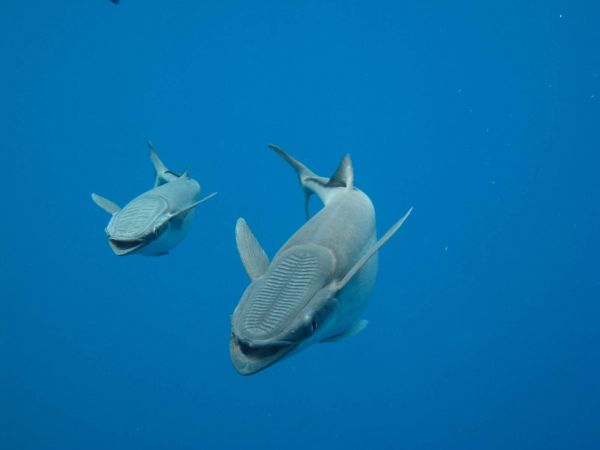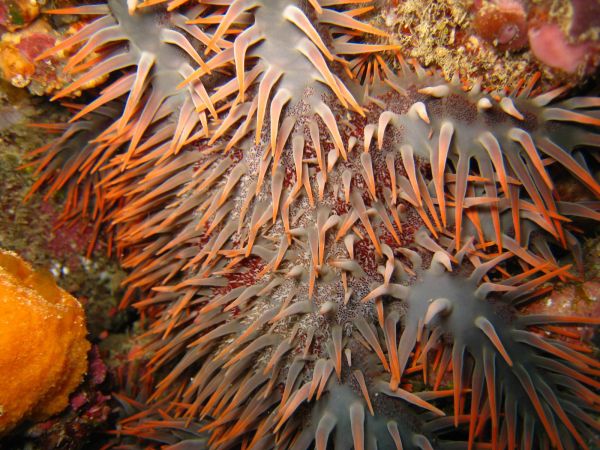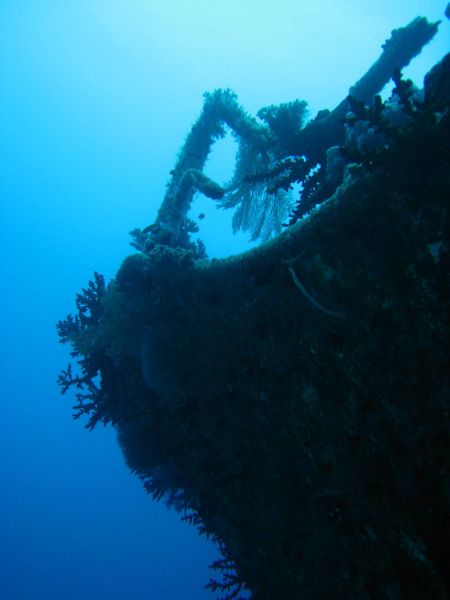Since my South-African bath with the great white sharks and the sandtiger sharks, I developed a certain fascination for this often extraordinary-sized cartilaginous fish. The animal which stands at the apex of the food chain reached such a level of perfection for predation that it has hardly evolved for the last 200 millions years.
After a fruitless attempt a week ago, I go back to Pacific Harbour where two dive centers offer the shark-feeding, an activity we can condemn on one side since it interacts with animal kingdom but respectful on another side because it serves to promote the protection of this sensitive fish which often finishes in the too tight-meshed nets or hooked up a rod of a stupid fishing game.
On the boat, we receive strict orders because no protective cage will surround us. We'll stay behind a rope flanked by two stick-equipped divers who will move aside a possible oncoming shark. 2 other divers will be in charge of feeding the sharks, opening two big dustbins full of tuna leftovers. And the festival begins. A lot of opportunistic fish such as big-eyed jacks or remoras swim around and try to pick up a chunk on the way. But these fish give way when the cartilaginous predators arrive, among them the two most aggressive ones in the world, the tiger shark and the bull shark. Lemon-, tawny nurse- and reef sharks will complete this great diversity.
One of the crew members approaches me, seizes my arm and pulls me to the stage. A tawny nurse shark lays down on the bottom when my hand holds out towards the animal and gently strokes its rough skin. Because the skin of a shark is not smooth; it's dotted of countless mini-teeth and was formerly sold as tool to sand the hulls of the boats. These bumps serve to break out the vortex of the water which forms when the shark swims and improve its hydrodynamism. I take back my position behind the rope and keep my eyes wide-open in front of the show. A dive not as the other ones among the kingdom of the predators.





Keyword - emotions -
Wednesday 1 October 2008
feeding the sharks
By dorian on Wednesday 1 October 2008, 16:35 - RTW2-Fiji
Sunday 28 September 2008
exhilaration at the other end of the world
By dorian on Sunday 28 September 2008, 16:26 - RTW2-Fiji

Nadi airport on the main island of Fiji, first contact with a Pacific island. I arrive for two weeks and am going to try to live in a local way for that time, that means not looking beyond the present. In the arrival hall, a travel agent unsuccessfully tries to sell me an all-inclusive tour. Despite my stubbornness not to book one of his excursions, he keeps on smiling and gives me a precious piece of advice which will prove to be essential for the next stage of my trip. In substance, he encourages me no to stay on the main island (Viti Levu where there are the towns of Nadi, Lautoka or Suva) and get to the small islands which are the heart of the Fijian spirit.
The population is a mix of Melanesians and Indians whose ancestors emigrated to Fiji in order to work in the sugar cane fields. These workers finally stayed and today represent 40% of the total population. This racial disparity is the main cause of the political instability where each community reproaches the other one its hegemonic desires. These last years, 2 coups d'état shook the country and consequently, the tourism dramatically dropped down.
Nadi is not really appealing. The next day, I hop on a minivan and head eastwards. My intention is to stop in the village of Pacific Harbour where we can dive with sharks. Unfortunately, I haven't booked in advance and the dive center is full for the next three days. Too much waiting, I pack my bag and set off again the next day. After one hour by car, I reach the capital city Suva where I board on a ferry in direction of the island of Taveuni. A long 20-hour cruise which drops me off on one of those remote islands where I hope to meet the Fijian culture and joie de vivre (exhilaration) praised by the travel agent at the airport. The ferry moors to a mere pontoon with no building around. A few taxis wait for the passengers but I prefer to stretch out my leg by walking along the coconut-tree-flanked coastal road. On the way, I stop at a dive center where I book an outing for the next day then I take to the way again towards the village of Naqara. A short hour of stroll where I pass alongside the local dwellings stifled by an invading vegetation. Native people offer me large smiles followed by a welcoming « Bula » (Welcome or good morning in Fijian). Life serenely goes on this small bit of land.
The dive center stands comparison with the villagers, laid-back atmosphere, certain joie de vivre and contagious smiles. On the boat, the warm-hearted ambiance carries on, we talk about rugby and I state that I'm coming from a city (Toulon) where rugby resembles a religion and is the topic of countless impassioned conversations. During our chat, I says that two Fijian players belong to the team (Sissa Koyamaibole et Gabiriele Lovobalavu). To these words, Jimmy, who officiates as captain of the boat this morning, suddenly turns back and says « you know Gabiriele Lovobalavu ! ». He informs me that his elder brother Kanito lives and works on the island in position of health inspector for the ministry of Health. He takes his phone, immediately calls him and an appointment is got for the next day. On top of the exceptional seabed that the Somosomo strait and the Rainbow reef offer, I'll be able to dip into the Fijian intimacy.


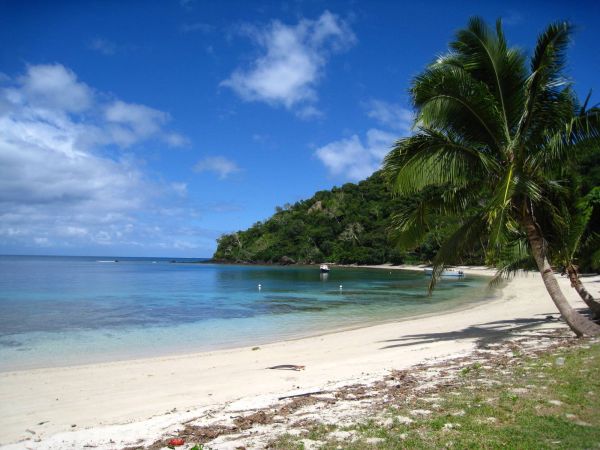

























The next day, I go to the police station where all the team mustered around a bowl of Kava to celebrate an event I forgot the name. That's here Kanito have given the appointment to me. I sit down as discreetly as possible when someone holds a microphone out to me asking to introduce myself. About thirty of pairs of eyes riveted on me, I stand up and explain why I'm here ; Then I keep on shaking the hands of all the guests. The following of the meeting is more informal when every two minutes someone holds out to me a coconut bowl full of kava I must knock back. The kava is the national beverage, a pounded root mixed with water which has the taste and the colour of the muddy water. With friends, family or workmates, there is no lack of opportunities to meet around this elixir.
outside this celebration, I take part of the sporting events as spectator with an athletic event and then a rugby tournament where each team represents a parish of the island. Guaranteed fervour around the playground. I will finish my evening at the Kanito's house with his family. Great time of sharing and laughing around the dinner with a special feature. At the other end of the world, a poster of the rugby club toulonnais is hanged to the wall.


Sunday 31 August 2008
the smokes of mounts Bromo and Semeru
By dorian on Sunday 31 August 2008, 09:24 - RTW2-Indonesia

Since I landed in Bali, a postcard-like picture constantly comes back to the point of haunting my curiosity. A curiosity that changed into an obsessional desire which would be defined as following: it it would appear to be a chaotic piling up of several perfectly-proportioned volcanoes set down an imposing caldeira. The ground of this caldeira would be covered by a sea of sand and fumaroles would rend its airs. To round off the dream, an ocean of clouds would encircle this cauldron the rising sun would stroke with its benevolent rays. I lived this dream.
The caldeira is called Tengger and the volcanic protagonists, Bromo, Batok, Kursi and Semeru. The nature within its complete and utter splendour. Departure from the village of Semero Lewang, we get up at 4 o'clock and walk down the caldeira. We tread on the sea of sand in the misty night up to the base of the Bromo. 253 steps complete this short stroll and hurl us onto the ridge of the crater. The dawn clears up the dark haze and the first shapes loom. We have left the Earth for an express journey to the moon. We walk around the crater which continually ejects its noxious fumes. In the distance, the Semeru splutters at regular intervals. A cotton-wool-like cloud which leaks from the tormented bowels of the Earth. Our loop ends in front of the staircase. Unique human-print appearance in a land that is not dedicated to him.














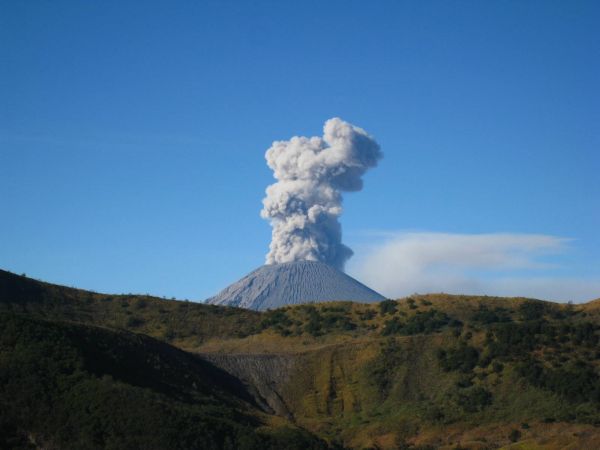






After experiencing the volcanic activity from inside, it's this postcard-like panorama described and admired so many times we want to reach. A very goal as soon as we wake up it summarizes with this short sentence: « be at the sunrise from the Penanjakan ». From the top of this hill, the nature gives us a good surprise modeling a new form of magic. Visual perfection which overshadows all the other senses. For a few hours, our eyes soak in everything. Attempting to describe something indescribable. Engraving something impalpable. The mounts of the last day didn't move, just the view angle changed. And what we lived? A sensory blaze of glory.




















« previous entries - page 3 of 10 - next entries »







